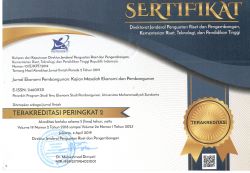The Determinants of Level of Society Welfare Within Fiscal Decentralization Framework In Regional Autonomy Era
Nuwun Priyono(1*), Siti Arifah(2), Eva Wulandari(3), Panji Kusuma Prasetyanto(4)(1) Universitas Tidar
(2) Universitas Tidar
(3) Universitas Tidar
(4) Universitas Tidar
(*) Corresponding Author
Abstract
The purpose of this study is to prove to what extent the influence that fiscal decentralization, local financial performance, local government expenditure, Locally Generated Recurring Revenues or Pendapatan Asli Daerah (PAD), Profit-Sharing Fund or Dana Bagi Hasil (DBH), General Allocation Fund or Dana Alokasi Umum (DAU), and Special Allocation Fund or Dana Alokasi Khusus (DAK) have on the level of society welfare. The objects of this research are Regencies and Municipalities in Java Island. The data used in this study are the secondary. The data on balance sheet and realization report of the regional revenues and expenditure budget (APBD) are from the Ministry of Finance of the Republic of Indonesia. The data on the level of society welfare that is proxyed by the value of HDI is obtained from Bappenas and BPS of Central Java. This research uses time series data from 2012-2014 periods. The research method used is the research of causality with linear regression model. The result of the significance test shows that only one DAK variable can partially affect the HDI variable. Meanwhile those variables other than DAK partially or individually do not influence the HDI variable. The result of regression analysis shows that simultaneously such variables as Fiscal Decentralization, Regional Finance Performance, Local Government Expenditure, PAD, DAU, DAK and DBH have an influence on HDI in Regencies / Municipalities in Java Island.
Keywords
Full Text:
PDFReferences
Adiputra, I.M.P, Dwiyantari , N.K.D & Darmada, D. K. (2015). Pengaruh PAD, Balancing fund dan SiLPA Terhadap Human development quality Dengan Capital expenditure allocation Sebagai Variable Intervening (Studi Pada Government Regency/Municipality di Bali). Sna 18.
Anggraini, T. & S. (2015). Pengaruh Financial ratio Regional government Terhadap Human Development Index Government Propinsi di Indonesia. SNA 18.
Barzelay, M. (1991). Managing Local Development Lesson from Spain. Policy Sciences, 271 290.
Bastian, I. (2006). Sistem Akuntansi Sektor Publik. In Salemba Empat (Edisi 2). Jakarta.
BPS. (2013). Human development Indonesia Year 2012 : Metode Baru. Retrieved from www.bps.go.id
BPS. (2015). Human Development Index Indonesia Year 2014: Metode Baru. Retrieved from www.bps.go.id
Cassette, Aurelie & Paty, S. (2010). Fiscal decentralization and the size of government: a European country empirical analysis. Public Choice, 143, 173189.
Ghozali, I. (2006). Aplikasi Analisis Multivariate dengan Program SPSS. In E. IV (Ed.), Badan Penerbit UNDIP. Semarang.
Greer, S. L. (2010). How Does Decentralisation Affect the Welfare State? Territorial Politics and the Welfare State in the UK and US. Soc.Pol, 39,2, 181201.
Gujarati, D. (2003). Basic Econometric. In Mc-Grawhill. New York.
Halim, A. (2007). Akuntansi Keuangan Daerah. In Penerbit Salemba Empat. Jakarta.
Halim, A. (2008). Akuntansi Keuangan Daerah. In Salemba Empat (Edisi Keti). Jakarta.
Kuncoro, H. (2004). Pengaruh Transfer Antar Government Pada Performance Fiskal Regional government Municipality Dan Regency Di Indonesia. Fakultas Ekonomi Universitas Gadjah Mada.
Kuncoro, M. (2011). Metode Kuantitatif: Teori dan Aplikasi Untuk Bisnis dan Ekonomi. In STIM YKPN (Edisi Keem). Yogyakarta.
Mahmudi. (2002). Manajemen Performance Sektor Publik. In UPP STIM YKPN. Yogyakarta.
Mahmudi. (2011). Akuntansi Sektor Publik. In UII Press (Cetakan Pe). Yogyakarta.
Mardiasmo. (2002). Regional autonomy dan Manajemen Keuangan Daerah. In Penerbit Andi. Yogyakarta.
Nuritomo & Rossieta. (2014). Politik Dinasti, Akuntabilitas dan Regional governments financial performance Di Indonesia. SNA 17 Universitas Mataram.
Priyono, N., Poerba, M. A., & Iswanaji, C. (2016). Analisis Pengaruh Fiscal decentralization dan PDRB Terhadap Level of society welfare dan Tingkat Pengangguran Terbuka In Regencies/Municipalities in Propinsi Central Java. In Strategi Pengembangan UMKM dan Indusytri Kreatif Sebagai Mesin Economic growth Indonesia (pp. 313326). Magelang.
Rachmat. (2010). Akuntansi Pemerintahan. In Penerbit CV Pustaka Setia. Bandung.
Saputra, B. (2011). Pengaruh Fiscal decentralization Terhadap Economic growth dan Peoples welfare. UII.
Sasana, H. (2009). Peran Fiscal decentralization Terhadap Performance Ekonomi di Regency/Municipality Provinsi Central Java. Jurnal Ekonomi Pembangunan, Vol. 10 No, hal. 103-124.
Simanjuntak, R. A. (2010). Fiscal decentralization dan Manajemen Makroekonomi: Urgensi Suatu Grand Design di Indonesia. Prisma, Vol. 29, N, 3557.
Sugiyono. (2009). Metodologi Penelitian Kuantitatif Kualitatif dan R&D. In Alfabeta (Cetakan ke). Bandung.
Suprasto, B. (2003). Peluang dan Tantangan Implementasi Anggaran Berbasis Performance. Buletin Studi Ekonomi, Vol. 11, 270:281. Retrieved from http://worldwideweb.co.id
Susantih, H & Saftiana, Y. (2009). Perbandingan Indicator Financial performance Government Provinsi se-Sumatera Bagian Selatan. Jurnal Program Pascasarjana Akuntansi Fakultas Ekonomi Universitas Sriwijaya.
Article Metrics
Abstract view(s): 878 time(s)PDF: 1359 time(s)
Refbacks
- There are currently no refbacks.
















